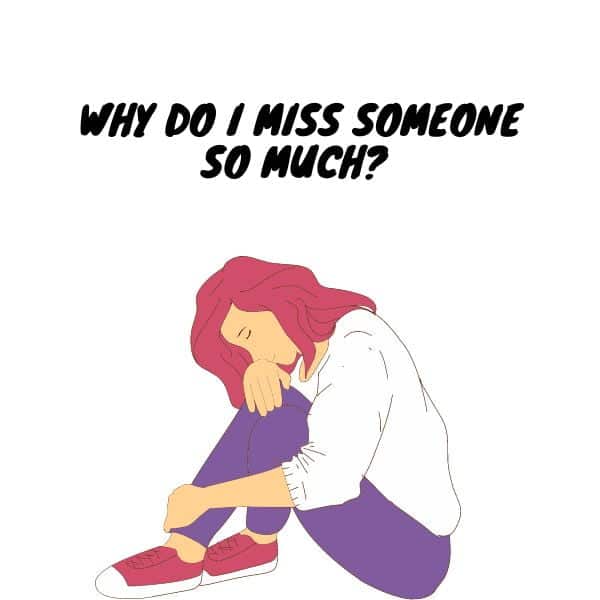1. Introduction
“Why do I miss someone so much?” is a question many of us have asked ourselves at some point. Whether it’s a former romantic partner, a dear friend who has moved away, or a loved one who has passed on, the longing can be intense. But why is this so? What’s happening in our brains that causes this deep sense of longing? This article delves into the fascinating psychology behind why we miss someone so much.
| Topic | Facts and Figures |
|---|---|
| Attachment Theory | Proposed by John Bowlby in the 1960s; it states that human beings form deep emotional bonds. |
| Oxytocin | Known as the “love hormone,” it increases feelings of attachment and bonding. |
| Dopamine | Proposed by John Bowlby in the 1960s, it states that human beings form deep emotional bonds. |
| Memory Consolidation | This neurotransmitter plays a significant role in motivation, reward, and perception of pleasure. |
| Social Media Usage | As of 2023, the average person spends 2.5 hours daily on social media. |
| Effective Coping Strategies | Mindfulness, staying active, journaling, and staying connected with others. |
2. Understanding Attachment
To begin, we must understand attachment. Coined by psychiatrist and psychoanalyst John Bowlby in the 1960s, attachment theory holds that humans form emotional bonds with others to survive and thrive. When babies, we’re wired to become attached to our caregivers. These early relationships serve as blueprints for our future connections.

When someone we’re closely attached to is absent, we naturally feel a void. This is the brain’s signalling that something important for survival is missing. This evolutionary basis of attachment is a key reason why we miss someone so much.
3. The Biochemistry of Missing Someone
Several biochemical factors are at play when we miss someone. The most notable among these are the hormones oxytocin and dopamine.

Oxytocin, often dubbed the “love hormone,” is involved in bonding and trust. When we’re close to someone, our interactions trigger the release of oxytocin, leading to feelings of happiness, warmth, and attachment. When that person is no longer there, the oxytocin levels drop, causing us to long for their presence to regain those feelings.
Dopamine, another key player, is a neurotransmitter associated with pleasure and reward. It’s released when we’re doing something we enjoy or with someone we love. Like oxytocin, dopamine levels can decrease when we’re away from a loved one, leading to feelings of longing.
4. The Role of Memory
Our memory plays a substantial role in why we miss people. Every interaction we have with a person creates a memory. Over time, these memories consolidate, particularly during rest or sleep. This process strengthens and stabilizes memories, making them more permanent in our minds.

When we miss someone, these consolidated memories resurface, causing us to reminisce and yearn for the past. Moreover, our brain tends to recall positive memories more vividly, which can amplify the feelings of missing someone.
5. The Impact of Social Media
In today’s digital age, social media significantly influences how much we miss someone. As of 2023, the average person spends about 2.5 hours daily on social media platforms. These platforms make it easy to stay connected with others and remind us of people we might miss.
Seeing photos, posts, and updates from the person you miss can exacerbate feelings of longing, as it keeps them present in your mind, even if they are physically distant.
6. Coping Strategies
Coping with missing someone can be tough. However, several psychological strategies can help you navigate through this challenging period:
- Practicing Mindfulness: Being present at the moment can help you appreciate your current surroundings and experiences, reducing feelings of longing for someone.
- Staying Active: Physical activity boosts mood-enhancing hormones like endorphins and can be a healthy distraction.
- Journaling: Writing about your feelings can provide an emotional outlet and offer perspective.
- Staying Connected: Keeping in touch with other loved ones can offer comfort and reduce feelings of loneliness.
7. Final Thoughts
Missing someone can be an emotionally draining experience. However, it’s a testament to our ability to form deep, meaningful connections—a fundamental aspect of being human. Remember, missing someone is perfectly normal, but taking care of your mental health is essential. If feelings of missing someone become overwhelming, don’t hesitate to seek help from a mental health professional.
We hope this article gave you a deeper understanding of why we miss someone so much and equipped you with some coping strategies. Remember, you’re not alone in your feelings; resources are available to help.
At VeryWellMindset.com, we rely on reputable sources, such as peer-reviewed studies, to ensure the accuracy and reliability of the facts presented in our articles. To gain insight into our meticulous fact-checking methods and how we uphold the trust of our readers, we invite you to explore our editorial process. It provides comprehensive details on how we maintain our content’s accuracy, reliability, and trustworthiness.

